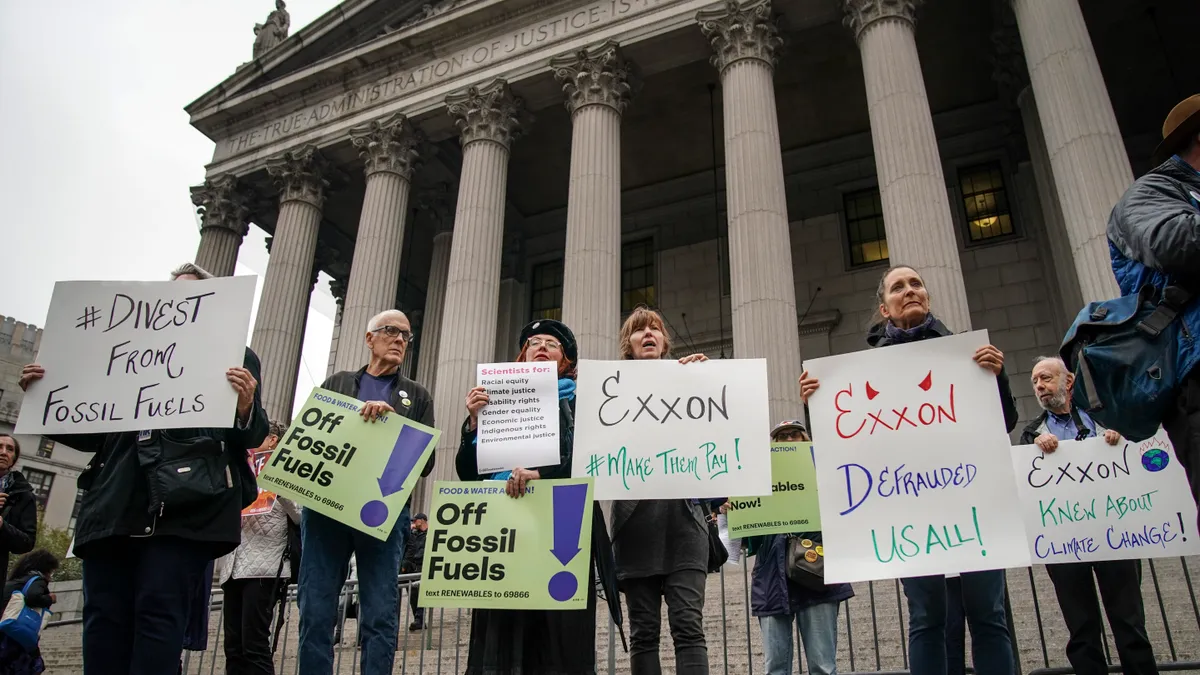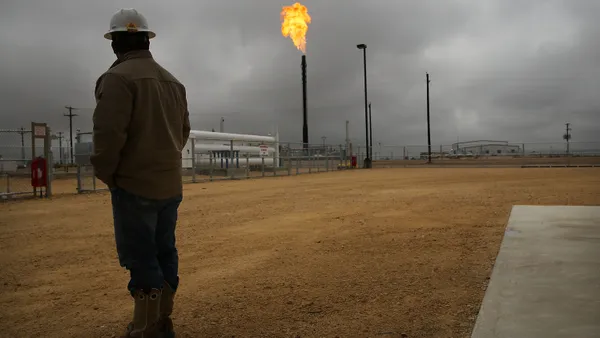Dive Brief:
- The annual number of climate-related lawsuits filed against the world’s largest fossil fuel producing companies has nearly tripled since the Paris Agreement was adopted in 2015, according to a recent report from Oil Change International and Zero Carbon Analytics. Companies facing climate suits include BP, Chevron, ExxonMobil and Shell.
- Out of the 86 climate lawsuits filed against fossil fuel producers, three categories have gained the most traction in recent years: the majority ask for compensation for climate-related damages, such as extreme weather events (38%), followed by greenwashing or false advertising allegations (16%) and complaints about companies’ failure to set and implement emissions reduction plans (12%), per the report’s findings.
- The most successful lawsuits center around allegations of greenwashing or misleading advertising, the report said. Eight of nine such filed cases that have been concluded have led to “decisions against the companies or the companies retracting the claims in question.”
Dive Insight:
The number of climate-related lawsuits filed against the largest fossil fuel producers remains modest, but the rise in such cases could eventually impact the companies’ bottom lines, according to the September report.
In 2023, 14 climate cases were filed against large oil, gas and coal companies compared to five cases being filed in 2015. The analysis covers cases filed both in the U.S. and abroad.
Despite the uptick in legal filings, no oil and gas company has had to pay liability for damages associated with climate change, according to the report.
“If courts and governments start holding oil and gas companies liable for climate change damages, the costs to companies, their investors and insurers could be very significant, as could the financial benefits to communities around the world harmed by climate disasters and other impacts,” the report said.
One closely watched case highlighted in the report is the city and county of Honolulu’s lawsuit accusing major oil and gas companies of “deliberately concealing and misrepresenting the climate-change impacts of their fossil fuel products.”
In June, the U.S. Supreme Court asked the Biden administration to share its views on a bid by the companies to overturn the Hawaii Supreme Court’s decision to allow Honolulu’s claims to move forward.
Chicago and California are also among the cities and states who have filed climate-related lawsuits against some of the major fossil fuel producers in recent years. The American Petroleum Institute has been critical of the lawsuits, with the group’s general counsel previously saying that “climate policy is for Congress to debate and decide — not the court system.”
The first climate change-related case predominantly or solely focused on alleged misleading advertising by the largest fossil fuel producers was submitted in 2019. Since then, there have been 14 such cases filed to date, according to the report.
An instance of such cases succeeding occurred when Dutch advertising authorities ruled in 2021 that Shell’s claims of carbon neutrality were misleading because the company could not back up its claims that carbon offsetting worked in practice.
Subsequently, in 2023, the UK’s Advertising Standards Authority banned a Shell ad campaign promoting its green initiatives because they were “likely to mislead.”
The Oil Change International and Zero Carbon Analytics report said that the “significant upward trend in new cases being filed against fossil fuel companies appears likely to continue.”
Oil Change International is a research and advocacy organization focused on detailing the true costs of fossil fuels and facilitating the transition to clean energy. Zero Carbon Analytics is an international research group that provides insights about climate change and the energy transition.











